Managing Organizational Practices with Post-Bureaucratic Approaches
VerifiedAdded on 2023/06/04
|9
|2468
|139
Essay
AI Summary
This essay discusses the evolution of organizational management practices, structures, and processes with the advent of post-bureaucratic management approaches. It contrasts the traditional bureaucratic model with the modern post-bureaucratic approach, highlighting the shift towards transparency, openness, and employee involvement in problem-solving. The essay emphasizes the role of organizational culture in facilitating this transition, noting that a congenial work environment fosters better performance and profitability. It also addresses how post-bureaucratic management improves organizational structure, practices, and processes by promoting teamwork, effective problem resolution, and enhanced business operations. The reflective response details how feedback from a previous assignment was used to improve grammar, sentence construction, critical analysis, and the use of credible academic sources.
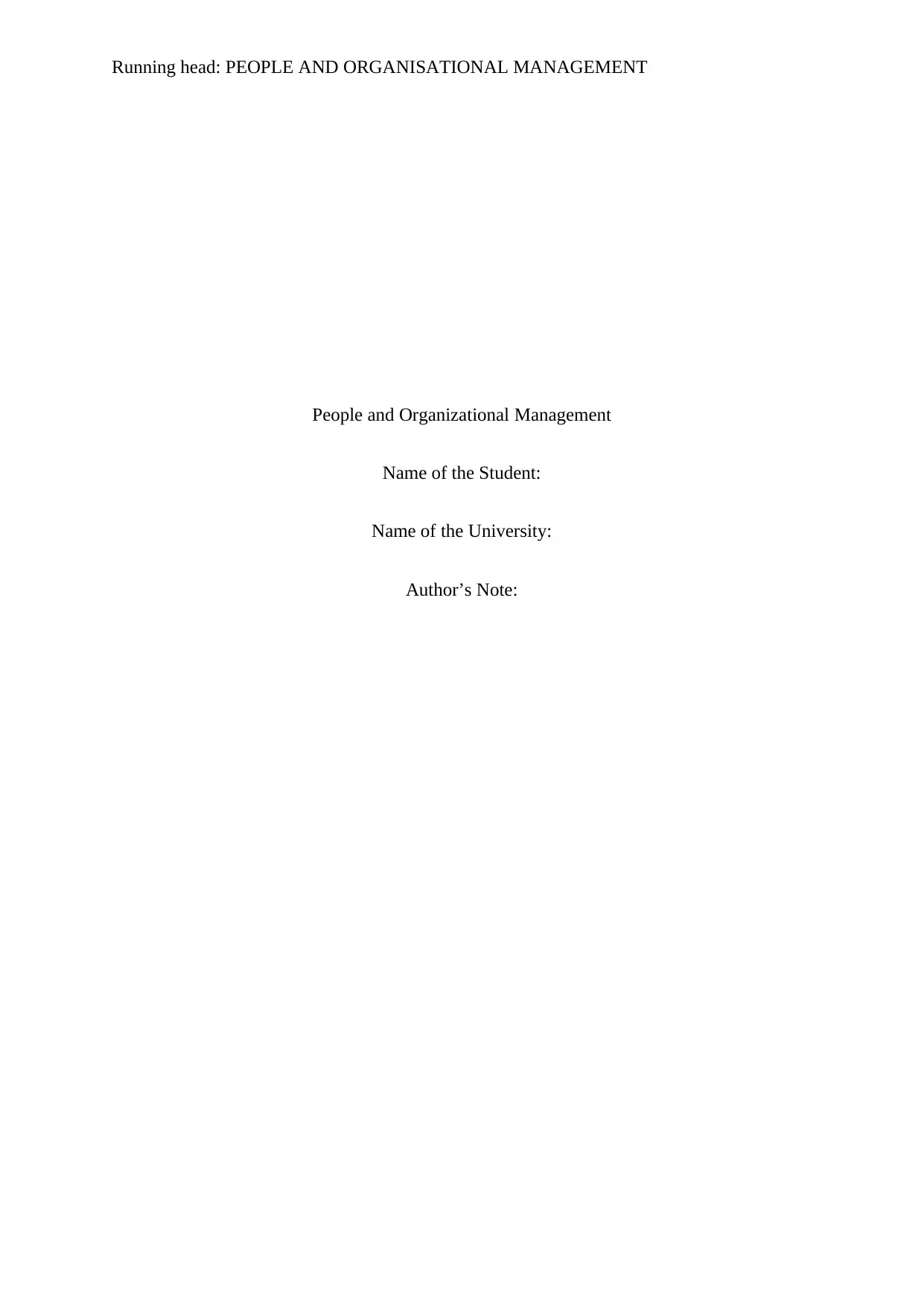
Running head: PEOPLE AND ORGANISATIONAL MANAGEMENT
People and Organizational Management
Name of the Student:
Name of the University:
Author’s Note:
People and Organizational Management
Name of the Student:
Name of the University:
Author’s Note:
Paraphrase This Document
Need a fresh take? Get an instant paraphrase of this document with our AI Paraphraser
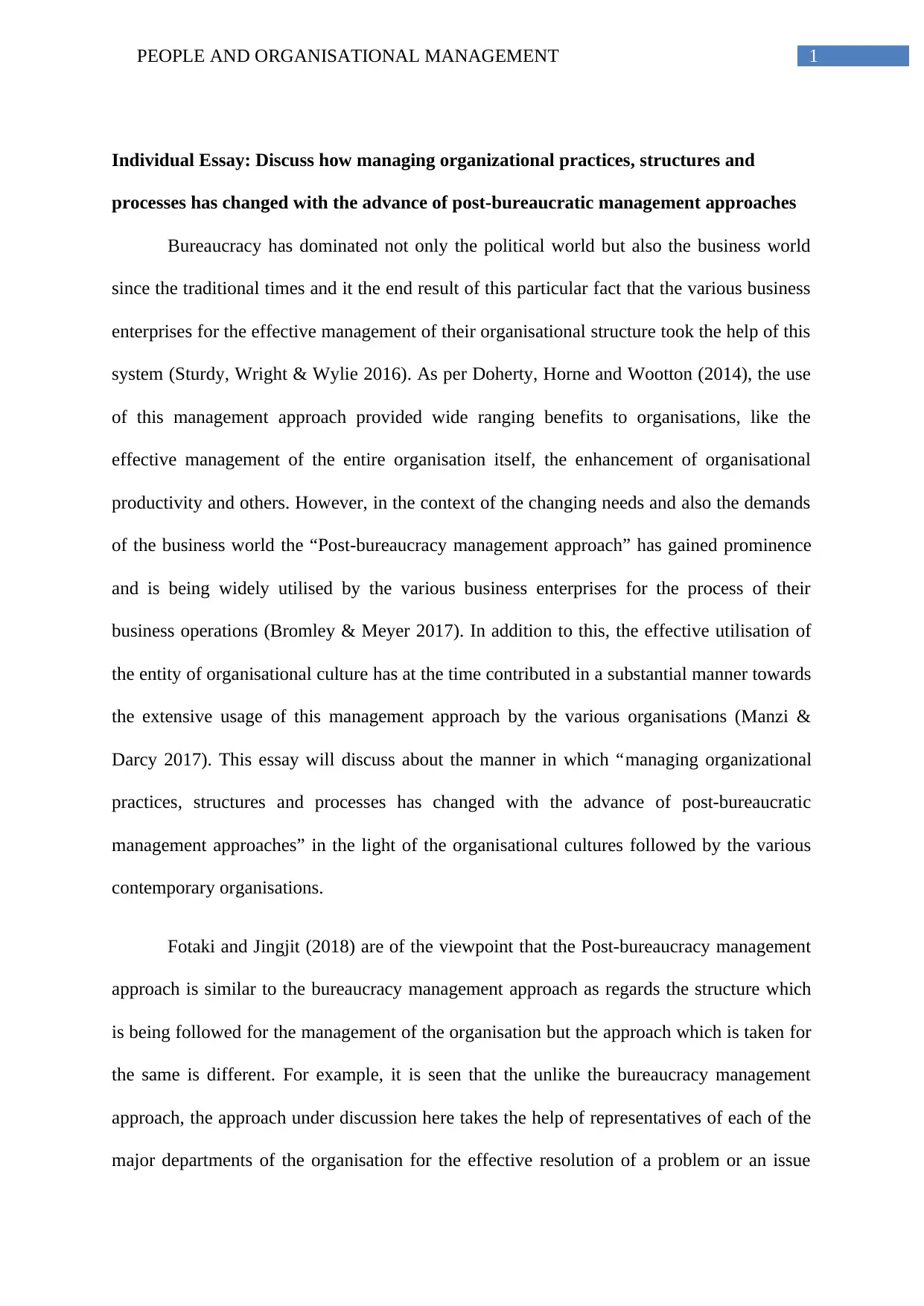
1PEOPLE AND ORGANISATIONAL MANAGEMENT
Individual Essay: Discuss how managing organizational practices, structures and
processes has changed with the advance of post-bureaucratic management approaches
Bureaucracy has dominated not only the political world but also the business world
since the traditional times and it the end result of this particular fact that the various business
enterprises for the effective management of their organisational structure took the help of this
system (Sturdy, Wright & Wylie 2016). As per Doherty, Horne and Wootton (2014), the use
of this management approach provided wide ranging benefits to organisations, like the
effective management of the entire organisation itself, the enhancement of organisational
productivity and others. However, in the context of the changing needs and also the demands
of the business world the “Post-bureaucracy management approach” has gained prominence
and is being widely utilised by the various business enterprises for the process of their
business operations (Bromley & Meyer 2017). In addition to this, the effective utilisation of
the entity of organisational culture has at the time contributed in a substantial manner towards
the extensive usage of this management approach by the various organisations (Manzi &
Darcy 2017). This essay will discuss about the manner in which “managing organizational
practices, structures and processes has changed with the advance of post-bureaucratic
management approaches” in the light of the organisational cultures followed by the various
contemporary organisations.
Fotaki and Jingjit (2018) are of the viewpoint that the Post-bureaucracy management
approach is similar to the bureaucracy management approach as regards the structure which
is being followed for the management of the organisation but the approach which is taken for
the same is different. For example, it is seen that the unlike the bureaucracy management
approach, the approach under discussion here takes the help of representatives of each of the
major departments of the organisation for the effective resolution of a problem or an issue
Individual Essay: Discuss how managing organizational practices, structures and
processes has changed with the advance of post-bureaucratic management approaches
Bureaucracy has dominated not only the political world but also the business world
since the traditional times and it the end result of this particular fact that the various business
enterprises for the effective management of their organisational structure took the help of this
system (Sturdy, Wright & Wylie 2016). As per Doherty, Horne and Wootton (2014), the use
of this management approach provided wide ranging benefits to organisations, like the
effective management of the entire organisation itself, the enhancement of organisational
productivity and others. However, in the context of the changing needs and also the demands
of the business world the “Post-bureaucracy management approach” has gained prominence
and is being widely utilised by the various business enterprises for the process of their
business operations (Bromley & Meyer 2017). In addition to this, the effective utilisation of
the entity of organisational culture has at the time contributed in a substantial manner towards
the extensive usage of this management approach by the various organisations (Manzi &
Darcy 2017). This essay will discuss about the manner in which “managing organizational
practices, structures and processes has changed with the advance of post-bureaucratic
management approaches” in the light of the organisational cultures followed by the various
contemporary organisations.
Fotaki and Jingjit (2018) are of the viewpoint that the Post-bureaucracy management
approach is similar to the bureaucracy management approach as regards the structure which
is being followed for the management of the organisation but the approach which is taken for
the same is different. For example, it is seen that the unlike the bureaucracy management
approach, the approach under discussion here takes the help of representatives of each of the
major departments of the organisation for the effective resolution of a problem or an issue
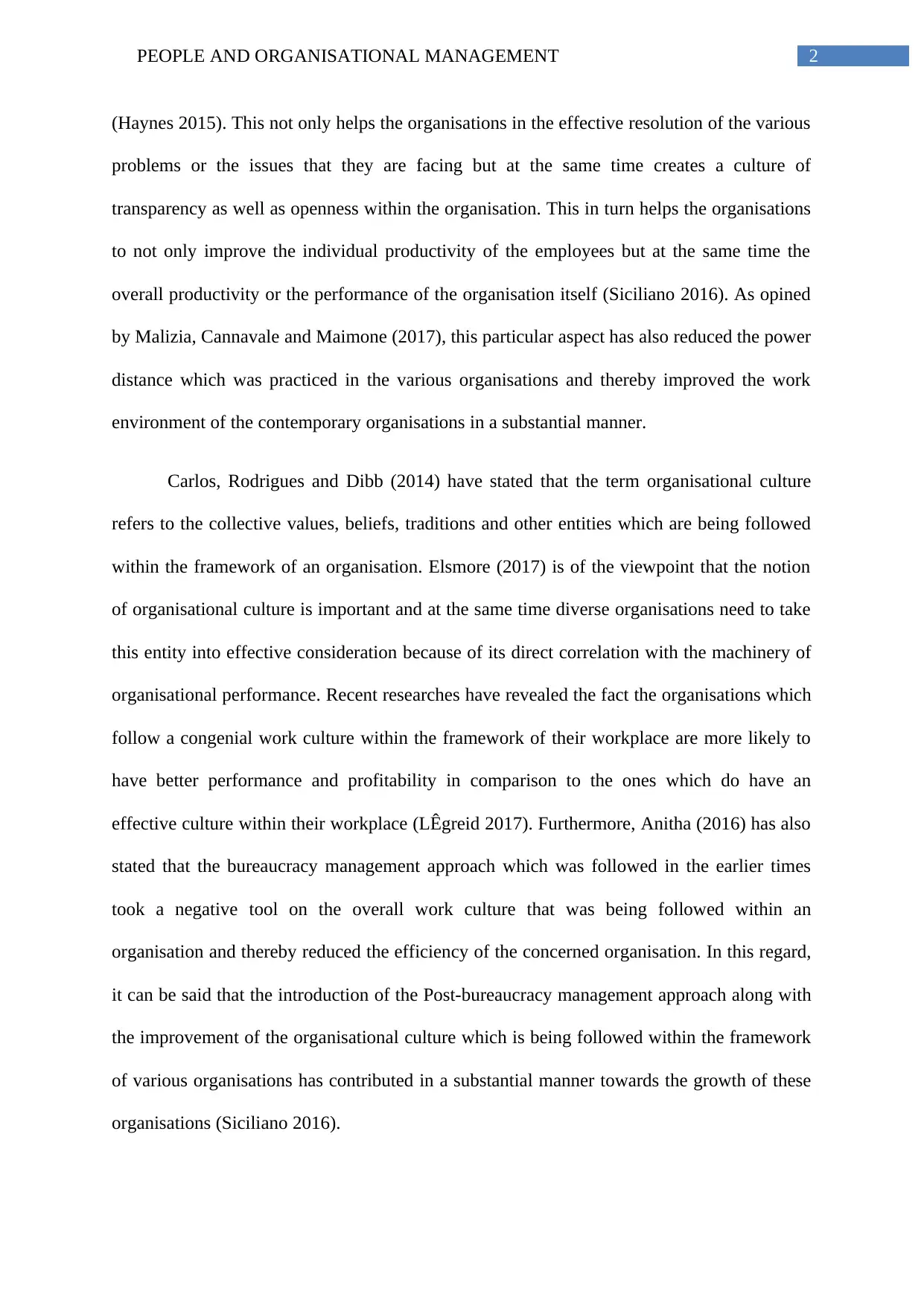
2PEOPLE AND ORGANISATIONAL MANAGEMENT
(Haynes 2015). This not only helps the organisations in the effective resolution of the various
problems or the issues that they are facing but at the same time creates a culture of
transparency as well as openness within the organisation. This in turn helps the organisations
to not only improve the individual productivity of the employees but at the same time the
overall productivity or the performance of the organisation itself (Siciliano 2016). As opined
by Malizia, Cannavale and Maimone (2017), this particular aspect has also reduced the power
distance which was practiced in the various organisations and thereby improved the work
environment of the contemporary organisations in a substantial manner.
Carlos, Rodrigues and Dibb (2014) have stated that the term organisational culture
refers to the collective values, beliefs, traditions and other entities which are being followed
within the framework of an organisation. Elsmore (2017) is of the viewpoint that the notion
of organisational culture is important and at the same time diverse organisations need to take
this entity into effective consideration because of its direct correlation with the machinery of
organisational performance. Recent researches have revealed the fact the organisations which
follow a congenial work culture within the framework of their workplace are more likely to
have better performance and profitability in comparison to the ones which do have an
effective culture within their workplace (LÊgreid 2017). Furthermore, Anitha (2016) has also
stated that the bureaucracy management approach which was followed in the earlier times
took a negative tool on the overall work culture that was being followed within an
organisation and thereby reduced the efficiency of the concerned organisation. In this regard,
it can be said that the introduction of the Post-bureaucracy management approach along with
the improvement of the organisational culture which is being followed within the framework
of various organisations has contributed in a substantial manner towards the growth of these
organisations (Siciliano 2016).
(Haynes 2015). This not only helps the organisations in the effective resolution of the various
problems or the issues that they are facing but at the same time creates a culture of
transparency as well as openness within the organisation. This in turn helps the organisations
to not only improve the individual productivity of the employees but at the same time the
overall productivity or the performance of the organisation itself (Siciliano 2016). As opined
by Malizia, Cannavale and Maimone (2017), this particular aspect has also reduced the power
distance which was practiced in the various organisations and thereby improved the work
environment of the contemporary organisations in a substantial manner.
Carlos, Rodrigues and Dibb (2014) have stated that the term organisational culture
refers to the collective values, beliefs, traditions and other entities which are being followed
within the framework of an organisation. Elsmore (2017) is of the viewpoint that the notion
of organisational culture is important and at the same time diverse organisations need to take
this entity into effective consideration because of its direct correlation with the machinery of
organisational performance. Recent researches have revealed the fact the organisations which
follow a congenial work culture within the framework of their workplace are more likely to
have better performance and profitability in comparison to the ones which do have an
effective culture within their workplace (LÊgreid 2017). Furthermore, Anitha (2016) has also
stated that the bureaucracy management approach which was followed in the earlier times
took a negative tool on the overall work culture that was being followed within an
organisation and thereby reduced the efficiency of the concerned organisation. In this regard,
it can be said that the introduction of the Post-bureaucracy management approach along with
the improvement of the organisational culture which is being followed within the framework
of various organisations has contributed in a substantial manner towards the growth of these
organisations (Siciliano 2016).
⊘ This is a preview!⊘
Do you want full access?
Subscribe today to unlock all pages.

Trusted by 1+ million students worldwide
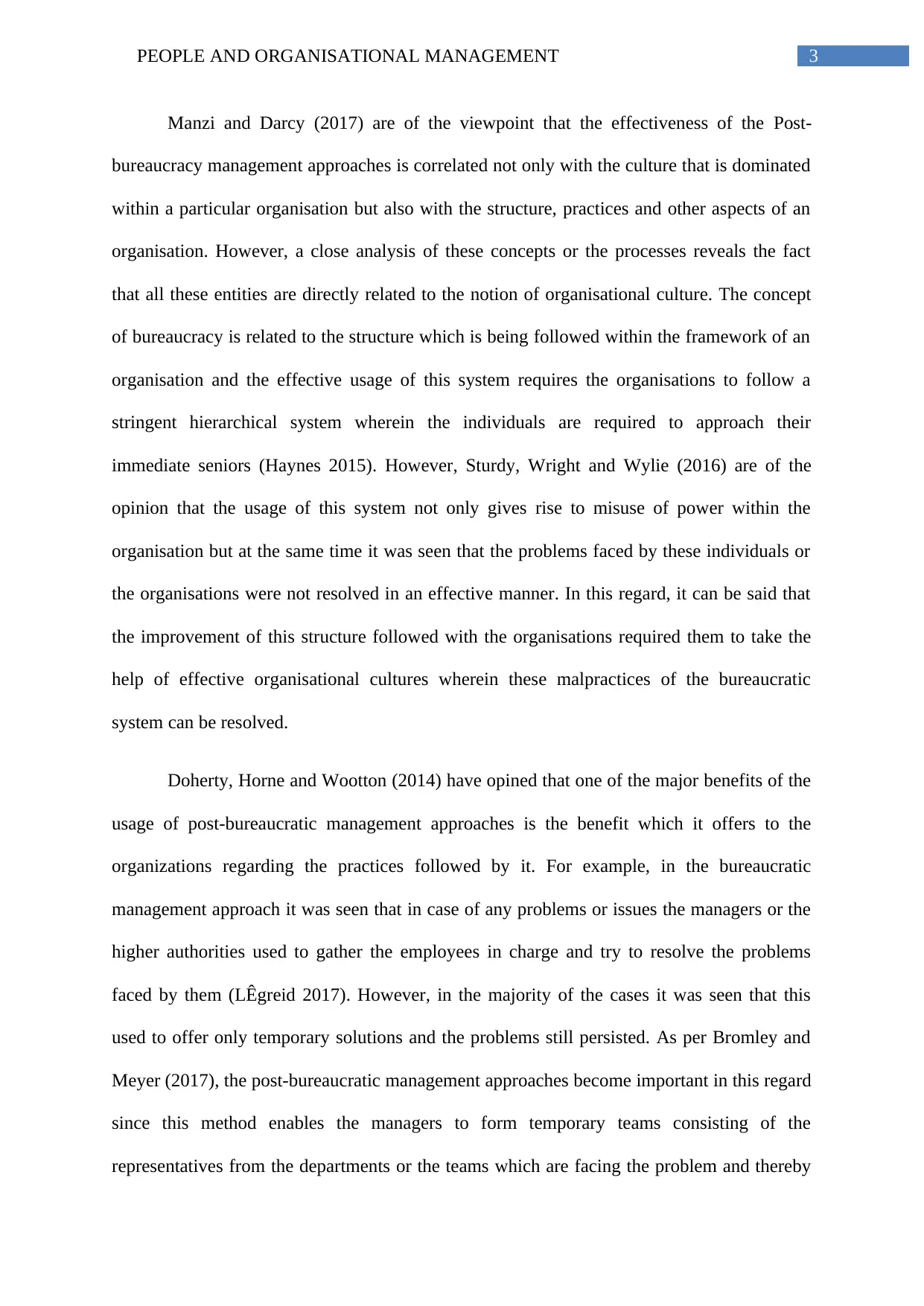
3PEOPLE AND ORGANISATIONAL MANAGEMENT
Manzi and Darcy (2017) are of the viewpoint that the effectiveness of the Post-
bureaucracy management approaches is correlated not only with the culture that is dominated
within a particular organisation but also with the structure, practices and other aspects of an
organisation. However, a close analysis of these concepts or the processes reveals the fact
that all these entities are directly related to the notion of organisational culture. The concept
of bureaucracy is related to the structure which is being followed within the framework of an
organisation and the effective usage of this system requires the organisations to follow a
stringent hierarchical system wherein the individuals are required to approach their
immediate seniors (Haynes 2015). However, Sturdy, Wright and Wylie (2016) are of the
opinion that the usage of this system not only gives rise to misuse of power within the
organisation but at the same time it was seen that the problems faced by these individuals or
the organisations were not resolved in an effective manner. In this regard, it can be said that
the improvement of this structure followed with the organisations required them to take the
help of effective organisational cultures wherein these malpractices of the bureaucratic
system can be resolved.
Doherty, Horne and Wootton (2014) have opined that one of the major benefits of the
usage of post-bureaucratic management approaches is the benefit which it offers to the
organizations regarding the practices followed by it. For example, in the bureaucratic
management approach it was seen that in case of any problems or issues the managers or the
higher authorities used to gather the employees in charge and try to resolve the problems
faced by them (LÊgreid 2017). However, in the majority of the cases it was seen that this
used to offer only temporary solutions and the problems still persisted. As per Bromley and
Meyer (2017), the post-bureaucratic management approaches become important in this regard
since this method enables the managers to form temporary teams consisting of the
representatives from the departments or the teams which are facing the problem and thereby
Manzi and Darcy (2017) are of the viewpoint that the effectiveness of the Post-
bureaucracy management approaches is correlated not only with the culture that is dominated
within a particular organisation but also with the structure, practices and other aspects of an
organisation. However, a close analysis of these concepts or the processes reveals the fact
that all these entities are directly related to the notion of organisational culture. The concept
of bureaucracy is related to the structure which is being followed within the framework of an
organisation and the effective usage of this system requires the organisations to follow a
stringent hierarchical system wherein the individuals are required to approach their
immediate seniors (Haynes 2015). However, Sturdy, Wright and Wylie (2016) are of the
opinion that the usage of this system not only gives rise to misuse of power within the
organisation but at the same time it was seen that the problems faced by these individuals or
the organisations were not resolved in an effective manner. In this regard, it can be said that
the improvement of this structure followed with the organisations required them to take the
help of effective organisational cultures wherein these malpractices of the bureaucratic
system can be resolved.
Doherty, Horne and Wootton (2014) have opined that one of the major benefits of the
usage of post-bureaucratic management approaches is the benefit which it offers to the
organizations regarding the practices followed by it. For example, in the bureaucratic
management approach it was seen that in case of any problems or issues the managers or the
higher authorities used to gather the employees in charge and try to resolve the problems
faced by them (LÊgreid 2017). However, in the majority of the cases it was seen that this
used to offer only temporary solutions and the problems still persisted. As per Bromley and
Meyer (2017), the post-bureaucratic management approaches become important in this regard
since this method enables the managers to form temporary teams consisting of the
representatives from the departments or the teams which are facing the problem and thereby
Paraphrase This Document
Need a fresh take? Get an instant paraphrase of this document with our AI Paraphraser
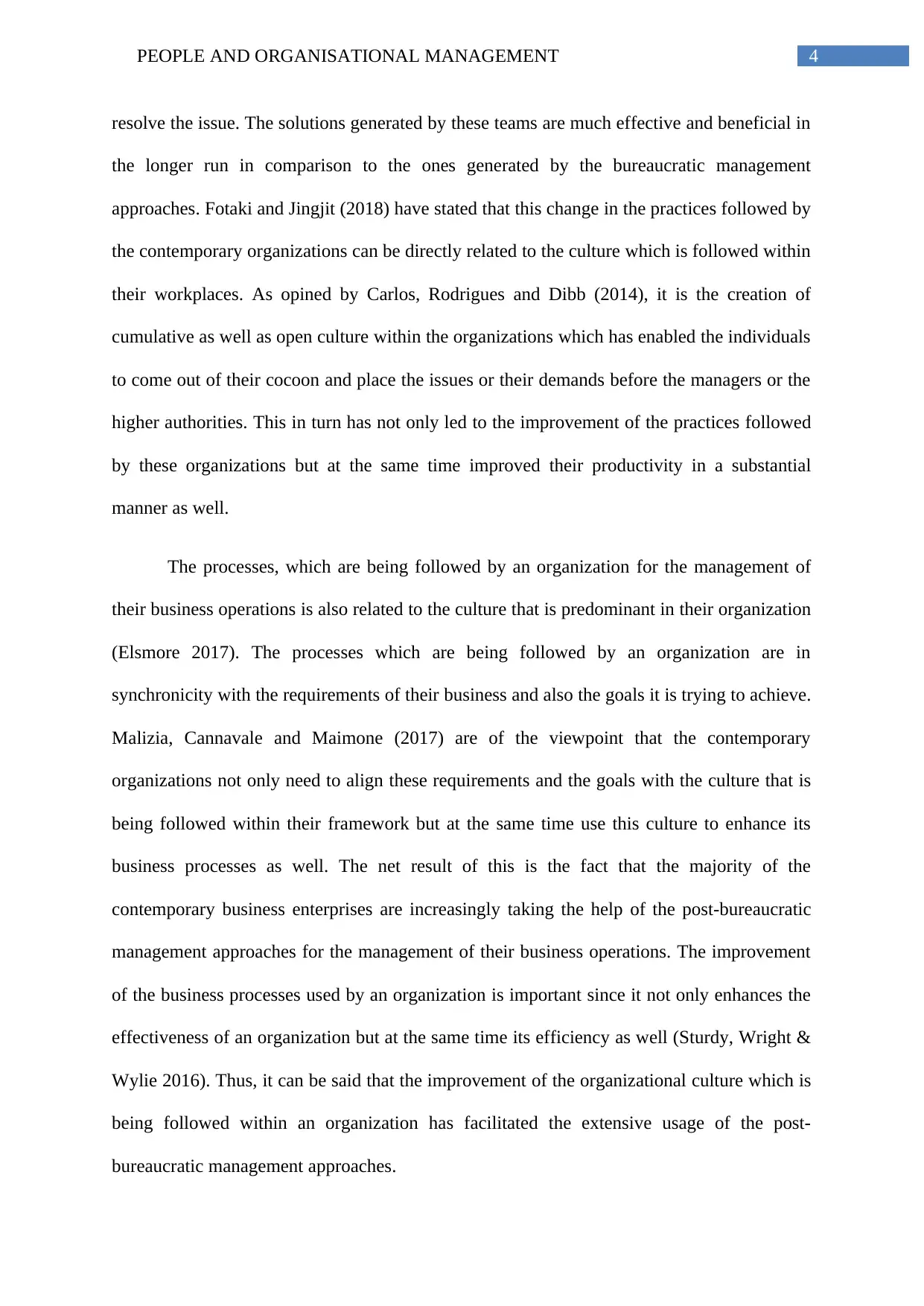
4PEOPLE AND ORGANISATIONAL MANAGEMENT
resolve the issue. The solutions generated by these teams are much effective and beneficial in
the longer run in comparison to the ones generated by the bureaucratic management
approaches. Fotaki and Jingjit (2018) have stated that this change in the practices followed by
the contemporary organizations can be directly related to the culture which is followed within
their workplaces. As opined by Carlos, Rodrigues and Dibb (2014), it is the creation of
cumulative as well as open culture within the organizations which has enabled the individuals
to come out of their cocoon and place the issues or their demands before the managers or the
higher authorities. This in turn has not only led to the improvement of the practices followed
by these organizations but at the same time improved their productivity in a substantial
manner as well.
The processes, which are being followed by an organization for the management of
their business operations is also related to the culture that is predominant in their organization
(Elsmore 2017). The processes which are being followed by an organization are in
synchronicity with the requirements of their business and also the goals it is trying to achieve.
Malizia, Cannavale and Maimone (2017) are of the viewpoint that the contemporary
organizations not only need to align these requirements and the goals with the culture that is
being followed within their framework but at the same time use this culture to enhance its
business processes as well. The net result of this is the fact that the majority of the
contemporary business enterprises are increasingly taking the help of the post-bureaucratic
management approaches for the management of their business operations. The improvement
of the business processes used by an organization is important since it not only enhances the
effectiveness of an organization but at the same time its efficiency as well (Sturdy, Wright &
Wylie 2016). Thus, it can be said that the improvement of the organizational culture which is
being followed within an organization has facilitated the extensive usage of the post-
bureaucratic management approaches.
resolve the issue. The solutions generated by these teams are much effective and beneficial in
the longer run in comparison to the ones generated by the bureaucratic management
approaches. Fotaki and Jingjit (2018) have stated that this change in the practices followed by
the contemporary organizations can be directly related to the culture which is followed within
their workplaces. As opined by Carlos, Rodrigues and Dibb (2014), it is the creation of
cumulative as well as open culture within the organizations which has enabled the individuals
to come out of their cocoon and place the issues or their demands before the managers or the
higher authorities. This in turn has not only led to the improvement of the practices followed
by these organizations but at the same time improved their productivity in a substantial
manner as well.
The processes, which are being followed by an organization for the management of
their business operations is also related to the culture that is predominant in their organization
(Elsmore 2017). The processes which are being followed by an organization are in
synchronicity with the requirements of their business and also the goals it is trying to achieve.
Malizia, Cannavale and Maimone (2017) are of the viewpoint that the contemporary
organizations not only need to align these requirements and the goals with the culture that is
being followed within their framework but at the same time use this culture to enhance its
business processes as well. The net result of this is the fact that the majority of the
contemporary business enterprises are increasingly taking the help of the post-bureaucratic
management approaches for the management of their business operations. The improvement
of the business processes used by an organization is important since it not only enhances the
effectiveness of an organization but at the same time its efficiency as well (Sturdy, Wright &
Wylie 2016). Thus, it can be said that the improvement of the organizational culture which is
being followed within an organization has facilitated the extensive usage of the post-
bureaucratic management approaches.
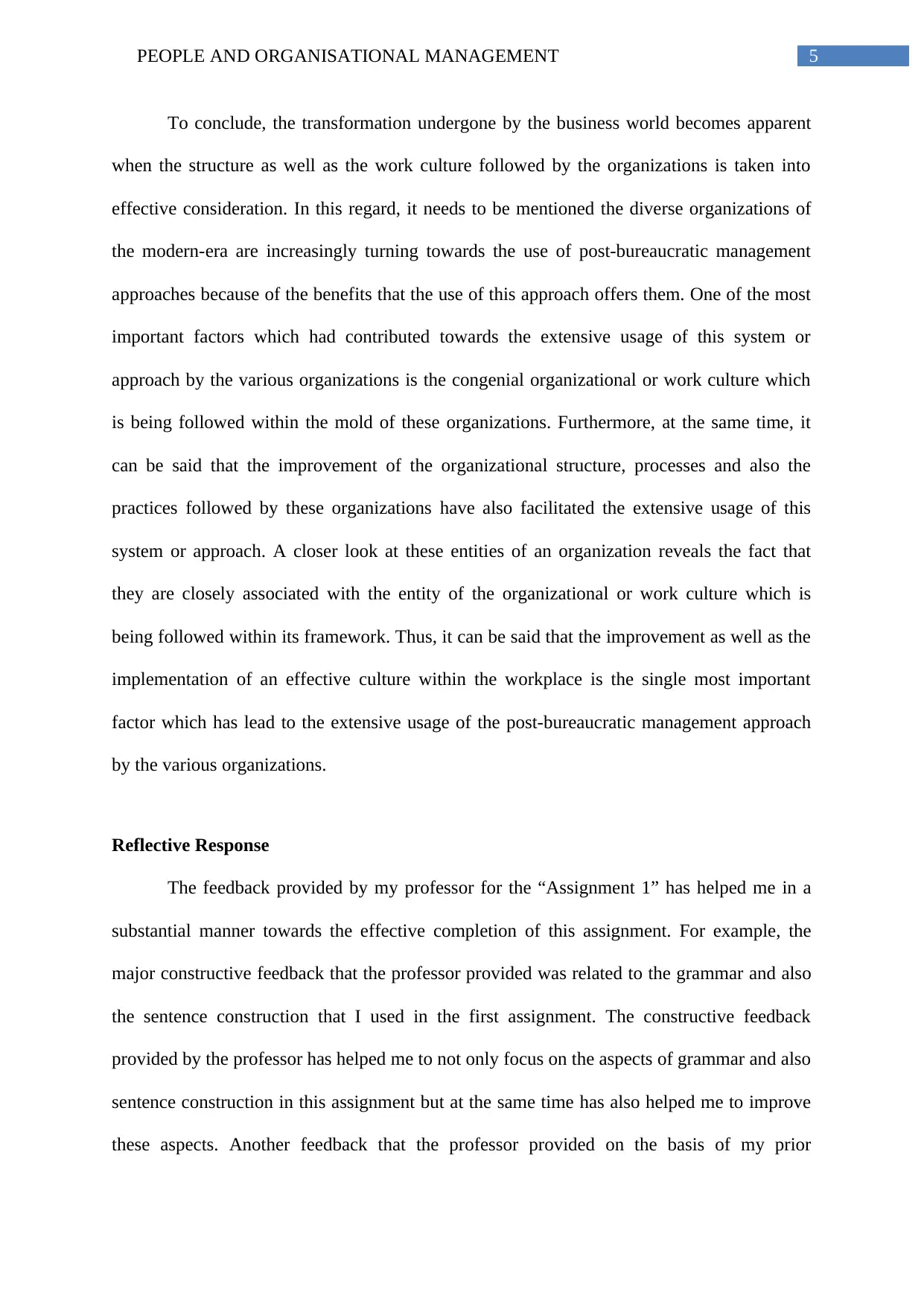
5PEOPLE AND ORGANISATIONAL MANAGEMENT
To conclude, the transformation undergone by the business world becomes apparent
when the structure as well as the work culture followed by the organizations is taken into
effective consideration. In this regard, it needs to be mentioned the diverse organizations of
the modern-era are increasingly turning towards the use of post-bureaucratic management
approaches because of the benefits that the use of this approach offers them. One of the most
important factors which had contributed towards the extensive usage of this system or
approach by the various organizations is the congenial organizational or work culture which
is being followed within the mold of these organizations. Furthermore, at the same time, it
can be said that the improvement of the organizational structure, processes and also the
practices followed by these organizations have also facilitated the extensive usage of this
system or approach. A closer look at these entities of an organization reveals the fact that
they are closely associated with the entity of the organizational or work culture which is
being followed within its framework. Thus, it can be said that the improvement as well as the
implementation of an effective culture within the workplace is the single most important
factor which has lead to the extensive usage of the post-bureaucratic management approach
by the various organizations.
Reflective Response
The feedback provided by my professor for the “Assignment 1” has helped me in a
substantial manner towards the effective completion of this assignment. For example, the
major constructive feedback that the professor provided was related to the grammar and also
the sentence construction that I used in the first assignment. The constructive feedback
provided by the professor has helped me to not only focus on the aspects of grammar and also
sentence construction in this assignment but at the same time has also helped me to improve
these aspects. Another feedback that the professor provided on the basis of my prior
To conclude, the transformation undergone by the business world becomes apparent
when the structure as well as the work culture followed by the organizations is taken into
effective consideration. In this regard, it needs to be mentioned the diverse organizations of
the modern-era are increasingly turning towards the use of post-bureaucratic management
approaches because of the benefits that the use of this approach offers them. One of the most
important factors which had contributed towards the extensive usage of this system or
approach by the various organizations is the congenial organizational or work culture which
is being followed within the mold of these organizations. Furthermore, at the same time, it
can be said that the improvement of the organizational structure, processes and also the
practices followed by these organizations have also facilitated the extensive usage of this
system or approach. A closer look at these entities of an organization reveals the fact that
they are closely associated with the entity of the organizational or work culture which is
being followed within its framework. Thus, it can be said that the improvement as well as the
implementation of an effective culture within the workplace is the single most important
factor which has lead to the extensive usage of the post-bureaucratic management approach
by the various organizations.
Reflective Response
The feedback provided by my professor for the “Assignment 1” has helped me in a
substantial manner towards the effective completion of this assignment. For example, the
major constructive feedback that the professor provided was related to the grammar and also
the sentence construction that I used in the first assignment. The constructive feedback
provided by the professor has helped me to not only focus on the aspects of grammar and also
sentence construction in this assignment but at the same time has also helped me to improve
these aspects. Another feedback that the professor provided on the basis of my prior
⊘ This is a preview!⊘
Do you want full access?
Subscribe today to unlock all pages.

Trusted by 1+ million students worldwide
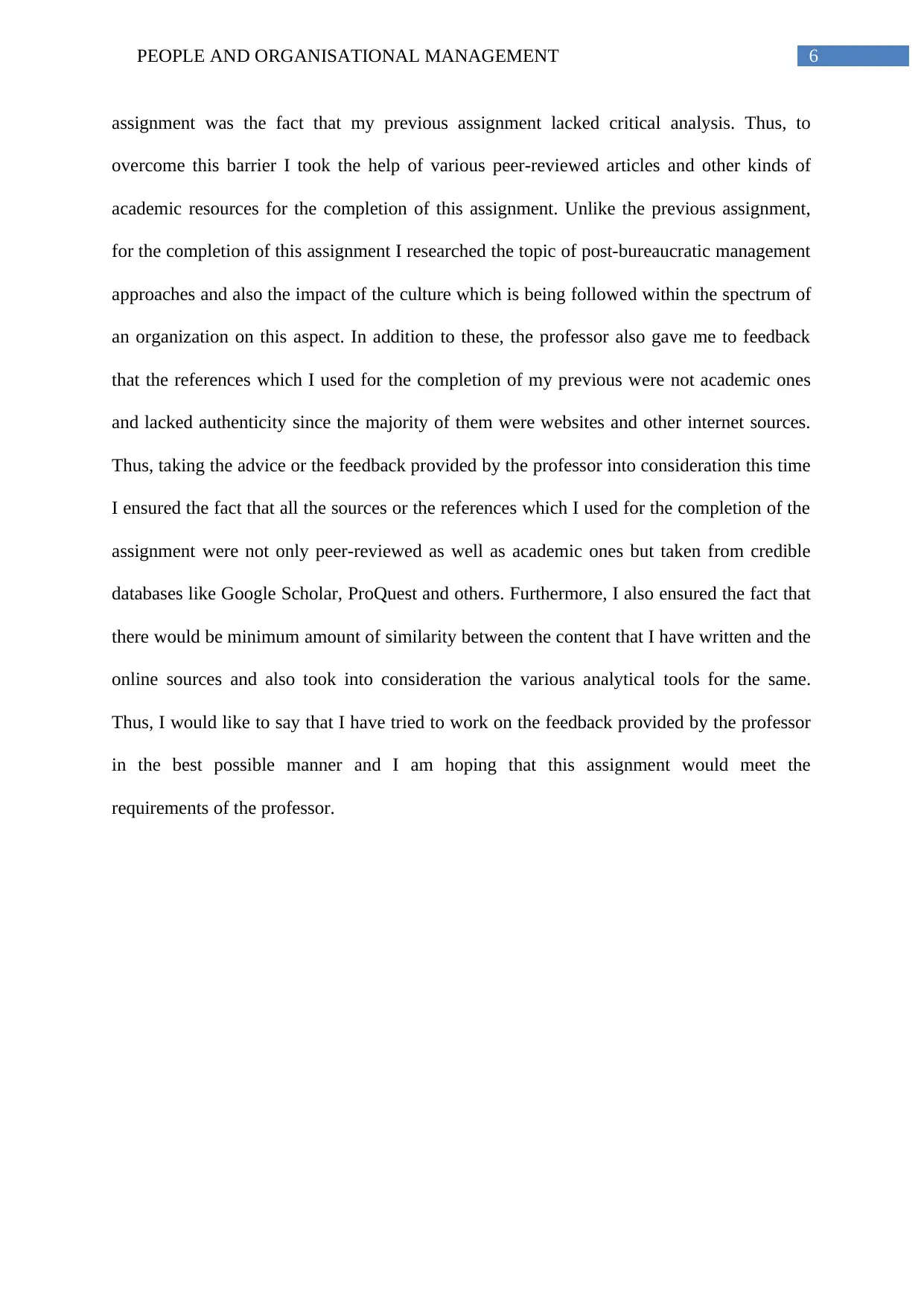
6PEOPLE AND ORGANISATIONAL MANAGEMENT
assignment was the fact that my previous assignment lacked critical analysis. Thus, to
overcome this barrier I took the help of various peer-reviewed articles and other kinds of
academic resources for the completion of this assignment. Unlike the previous assignment,
for the completion of this assignment I researched the topic of post-bureaucratic management
approaches and also the impact of the culture which is being followed within the spectrum of
an organization on this aspect. In addition to these, the professor also gave me to feedback
that the references which I used for the completion of my previous were not academic ones
and lacked authenticity since the majority of them were websites and other internet sources.
Thus, taking the advice or the feedback provided by the professor into consideration this time
I ensured the fact that all the sources or the references which I used for the completion of the
assignment were not only peer-reviewed as well as academic ones but taken from credible
databases like Google Scholar, ProQuest and others. Furthermore, I also ensured the fact that
there would be minimum amount of similarity between the content that I have written and the
online sources and also took into consideration the various analytical tools for the same.
Thus, I would like to say that I have tried to work on the feedback provided by the professor
in the best possible manner and I am hoping that this assignment would meet the
requirements of the professor.
assignment was the fact that my previous assignment lacked critical analysis. Thus, to
overcome this barrier I took the help of various peer-reviewed articles and other kinds of
academic resources for the completion of this assignment. Unlike the previous assignment,
for the completion of this assignment I researched the topic of post-bureaucratic management
approaches and also the impact of the culture which is being followed within the spectrum of
an organization on this aspect. In addition to these, the professor also gave me to feedback
that the references which I used for the completion of my previous were not academic ones
and lacked authenticity since the majority of them were websites and other internet sources.
Thus, taking the advice or the feedback provided by the professor into consideration this time
I ensured the fact that all the sources or the references which I used for the completion of the
assignment were not only peer-reviewed as well as academic ones but taken from credible
databases like Google Scholar, ProQuest and others. Furthermore, I also ensured the fact that
there would be minimum amount of similarity between the content that I have written and the
online sources and also took into consideration the various analytical tools for the same.
Thus, I would like to say that I have tried to work on the feedback provided by the professor
in the best possible manner and I am hoping that this assignment would meet the
requirements of the professor.
Paraphrase This Document
Need a fresh take? Get an instant paraphrase of this document with our AI Paraphraser
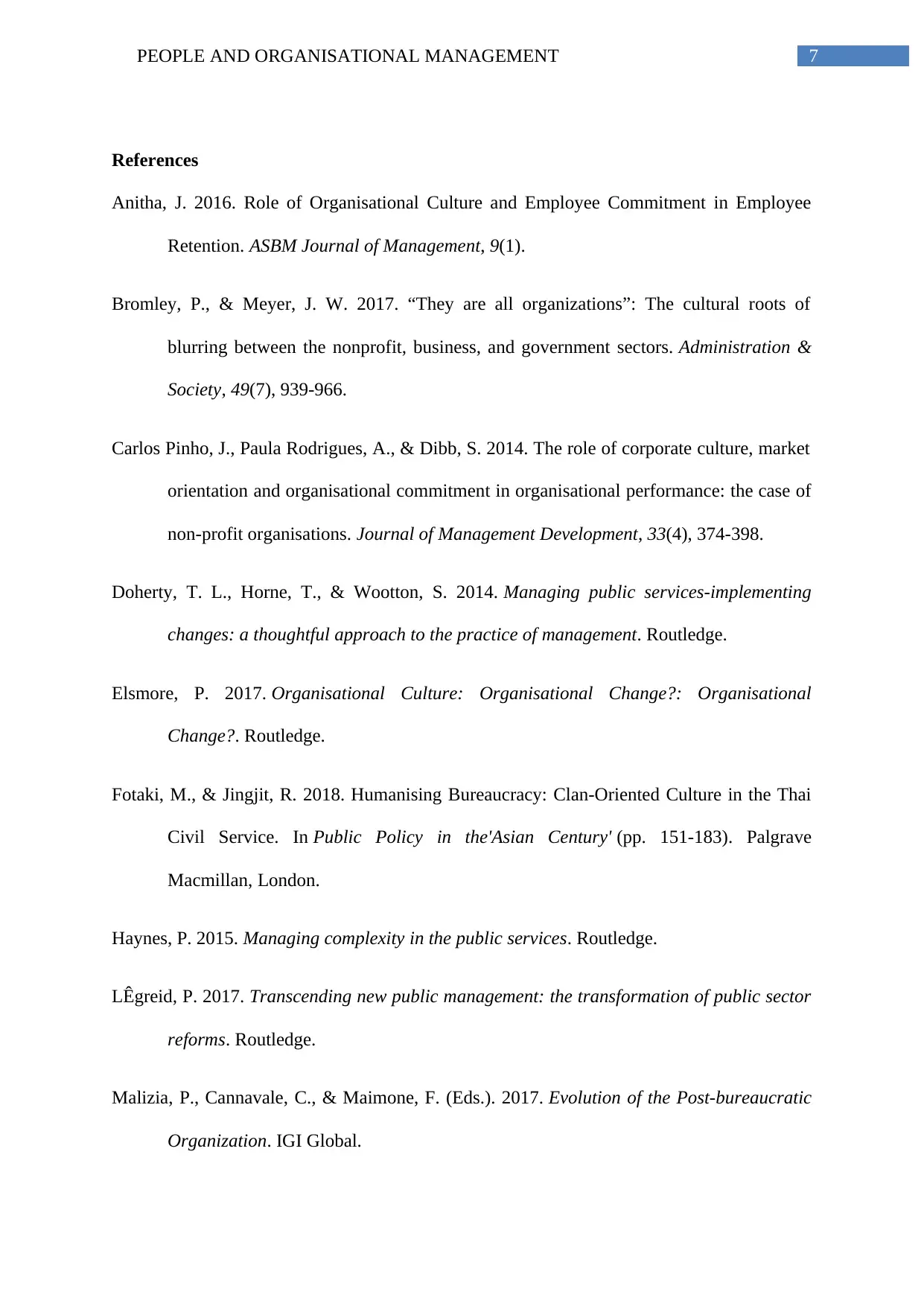
7PEOPLE AND ORGANISATIONAL MANAGEMENT
References
Anitha, J. 2016. Role of Organisational Culture and Employee Commitment in Employee
Retention. ASBM Journal of Management, 9(1).
Bromley, P., & Meyer, J. W. 2017. “They are all organizations”: The cultural roots of
blurring between the nonprofit, business, and government sectors. Administration &
Society, 49(7), 939-966.
Carlos Pinho, J., Paula Rodrigues, A., & Dibb, S. 2014. The role of corporate culture, market
orientation and organisational commitment in organisational performance: the case of
non-profit organisations. Journal of Management Development, 33(4), 374-398.
Doherty, T. L., Horne, T., & Wootton, S. 2014. Managing public services-implementing
changes: a thoughtful approach to the practice of management. Routledge.
Elsmore, P. 2017. Organisational Culture: Organisational Change?: Organisational
Change?. Routledge.
Fotaki, M., & Jingjit, R. 2018. Humanising Bureaucracy: Clan-Oriented Culture in the Thai
Civil Service. In Public Policy in the'Asian Century' (pp. 151-183). Palgrave
Macmillan, London.
Haynes, P. 2015. Managing complexity in the public services. Routledge.
LÊgreid, P. 2017. Transcending new public management: the transformation of public sector
reforms. Routledge.
Malizia, P., Cannavale, C., & Maimone, F. (Eds.). 2017. Evolution of the Post-bureaucratic
Organization. IGI Global.
References
Anitha, J. 2016. Role of Organisational Culture and Employee Commitment in Employee
Retention. ASBM Journal of Management, 9(1).
Bromley, P., & Meyer, J. W. 2017. “They are all organizations”: The cultural roots of
blurring between the nonprofit, business, and government sectors. Administration &
Society, 49(7), 939-966.
Carlos Pinho, J., Paula Rodrigues, A., & Dibb, S. 2014. The role of corporate culture, market
orientation and organisational commitment in organisational performance: the case of
non-profit organisations. Journal of Management Development, 33(4), 374-398.
Doherty, T. L., Horne, T., & Wootton, S. 2014. Managing public services-implementing
changes: a thoughtful approach to the practice of management. Routledge.
Elsmore, P. 2017. Organisational Culture: Organisational Change?: Organisational
Change?. Routledge.
Fotaki, M., & Jingjit, R. 2018. Humanising Bureaucracy: Clan-Oriented Culture in the Thai
Civil Service. In Public Policy in the'Asian Century' (pp. 151-183). Palgrave
Macmillan, London.
Haynes, P. 2015. Managing complexity in the public services. Routledge.
LÊgreid, P. 2017. Transcending new public management: the transformation of public sector
reforms. Routledge.
Malizia, P., Cannavale, C., & Maimone, F. (Eds.). 2017. Evolution of the Post-bureaucratic
Organization. IGI Global.
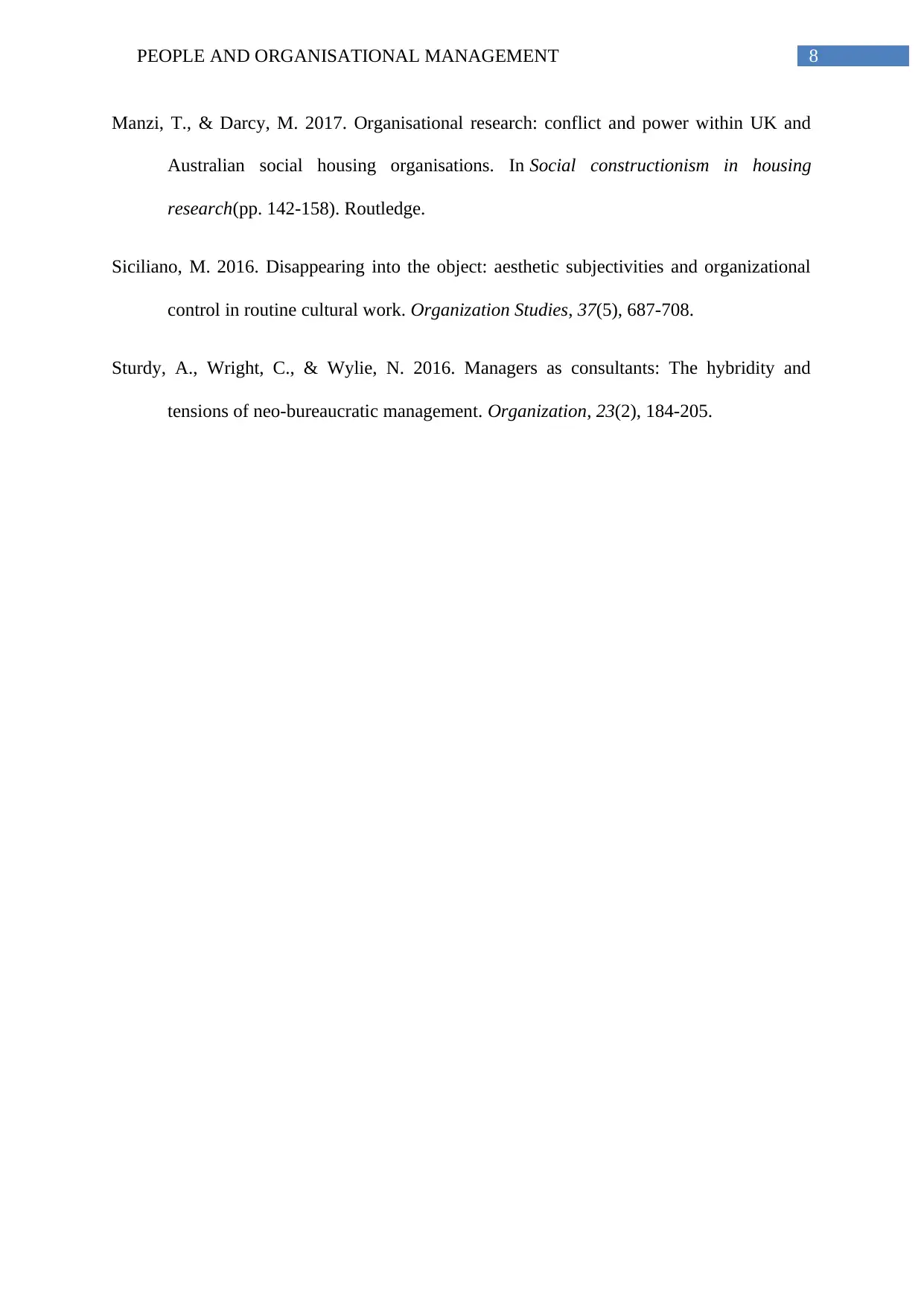
8PEOPLE AND ORGANISATIONAL MANAGEMENT
Manzi, T., & Darcy, M. 2017. Organisational research: conflict and power within UK and
Australian social housing organisations. In Social constructionism in housing
research(pp. 142-158). Routledge.
Siciliano, M. 2016. Disappearing into the object: aesthetic subjectivities and organizational
control in routine cultural work. Organization Studies, 37(5), 687-708.
Sturdy, A., Wright, C., & Wylie, N. 2016. Managers as consultants: The hybridity and
tensions of neo-bureaucratic management. Organization, 23(2), 184-205.
Manzi, T., & Darcy, M. 2017. Organisational research: conflict and power within UK and
Australian social housing organisations. In Social constructionism in housing
research(pp. 142-158). Routledge.
Siciliano, M. 2016. Disappearing into the object: aesthetic subjectivities and organizational
control in routine cultural work. Organization Studies, 37(5), 687-708.
Sturdy, A., Wright, C., & Wylie, N. 2016. Managers as consultants: The hybridity and
tensions of neo-bureaucratic management. Organization, 23(2), 184-205.
⊘ This is a preview!⊘
Do you want full access?
Subscribe today to unlock all pages.

Trusted by 1+ million students worldwide
1 out of 9
Related Documents
Your All-in-One AI-Powered Toolkit for Academic Success.
+13062052269
info@desklib.com
Available 24*7 on WhatsApp / Email
![[object Object]](/_next/static/media/star-bottom.7253800d.svg)
Unlock your academic potential
Copyright © 2020–2026 A2Z Services. All Rights Reserved. Developed and managed by ZUCOL.





